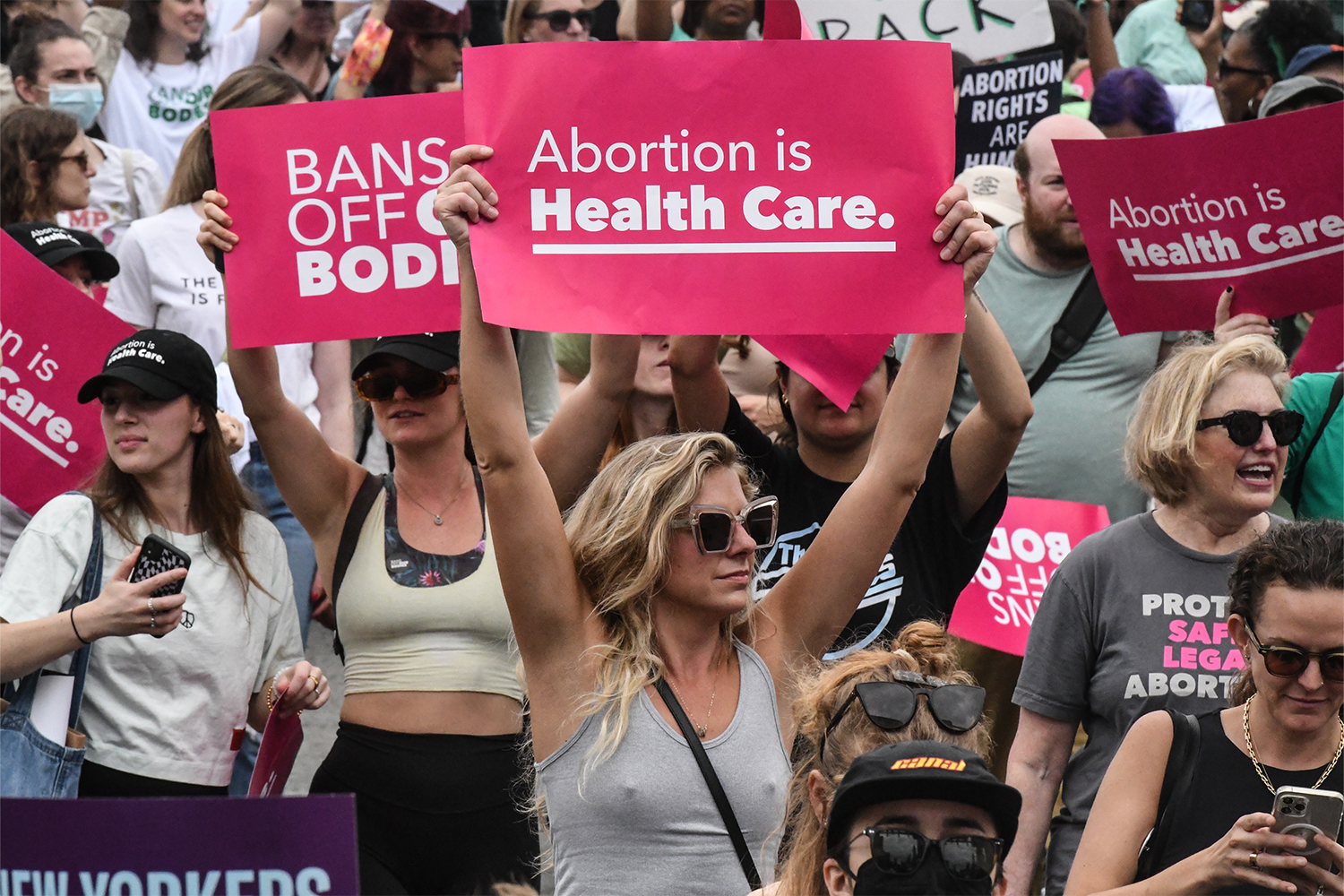Should Abortion Be a Business Issue?

The threat of overturning Roe v. Wade—which would allow states to ban abortion—is having an immediate impact in the U.S. After a draft opinion revealing that the Supreme Court voted to restrict abortion rights was leaked in May, public reaction was swift: Democrats unsuccessfully tried to pass federal legislation guaranteeing the right to abortion and people protested the looming threat across the country. Twenty six states are certain or likely to ban the procedure if Roe is struck down, according to research organization the Guttmacher Institute. (The court’s decision is not final but a published opinion is expected this month.)
Many businesses were also quick to speak out. Some workplaces said they would cover workers’ costs should they need to travel to a state that allows abortion, and others, like Lyft and H&M, signed a petition against restricting access to reproductive care. Amazon said it will reimburse staff up to US $4,000 in travel expenses should abortion services not be available in their home state. Denim brand Levi Strauss & Co. put out a statement saying employees can be reimbursed for health-related travel expenses for services, including abortion, not available in their home state. Apple also said it would cover abortion-related travel costs.
While U.S. companies may not have wanted to weigh in on abortion prior to the leak, the current circumstances gave them little choice, says Jennifer Reynolds, CEO of Women Corporate Directors, a membership group for women directors across the world, headquartered in Florida. “If governments are standing in the way of women’s health, it’s encouraging to see companies taking a stand on this issue,” says Reynolds.
Plus, weighing in on social and political issues can be a smart business move. About 61 per cent of Americans believe abortion should be legal in all or most cases, according to a Pew report, and a Leger poll found about four out of five Canadians support a women’s right to abortion. Because there’s a labour shortage in both the U.S. and Canada, it can be increasingly difficult to attract—or keep talent—without addressing an issue that affects about half of the labour force. Abortion has become a business consideration for many workplaces as providing a benefits package that affords women a full suite of healthcare options is attractive to job seekers. “I don’t think people would want to disclose that they need time off for an abortion, quite frankly—their privacy would be violated—so I think companies need to have health benefits packages which allow people time off, whether it’s for an abortion or some other medical procedure,” Reynolds says.
In Canada, there are no federal provisions in the Labour Code to give women time off for an abortion. Instead, people often resort to sick days, of which there are only 10 mandated per year. However, just recently in Alberta, the United Conservative Party introduced Bill 17, which would allow workers to take bereavement leave when a “pregnancy ends other than in a live birth”—including abortion. (Based on the bill, employers are only required to give three days of unpaid leave if an employee is seeking time off for an abortion.)
Currently, the cost of an abortion is largely covered by provincial healthcare, yet if one must go out-of-province for an abortion, that cost is not covered by the home province. And even though abortion is decriminalized in Canada, access is not equal across the country: In Prince Edward Island, procedures performed at private clinics are not covered by the province and abortions are not available for people who are more than 12 weeks and 6 days pregnant. In New Brunswick, out-of-hospital abortions are also not government funded and there are only three hospitals in the province that offer the service.
The impact of companies stepping up
Sarah Biggs, a partner at Olsen & Biggs Public Affairs who was part of the lobbying efforts for Bill 17, highlights that marginalized people, those living in rural areas and people who are employed in industries with precarious labour standards don’t have the economic luxury to take unpaid days off should they need an abortion. Outside of governmental intervention, Biggs says workplaces should offer more bereavement days—which can be used for abortion—to help level the playing field. “Employers should be encouraged to offer paid days off, as this would help with inequity. It would also help cover the costs and relieve financial pressure from taking time away from work,” Biggs says.
Jill Doctoroff, executive director of the National Abortion Federation Canada, also advocates for extended health benefits that cover abortion-related expenses, like time off, for out-of-province abortions. She says this is one of the best ways companies can show their support of reproductive rights. “In society we all have roles to play to ensure that people have access to abortion care—including businesses.”
Cost is of course a factor if businesses extend their benefit packages to include more sick days, or paid abortion leave. Larger organizations may be able to afford to offer more robust benefit plans to workers, whereas paying into benefit packages is often more expensive for smaller businesses due to the economies of scale, Reynolds says. “The smaller you are, the more expensive it’s going to be to provide those benefits.”
That said, workplaces—big or small—may view benefit packages as a way to retain employees outside of increasing pay and show they are valued in an organization. “It becomes a decision about what kind of a culture workplaces want to have,” Reynolds says.
In the U.S., Cary Franklin, faculty director of the Center for Reproductive Health, Law and Policy at UCLA Law, says that although some American companies do offer insurance plans that cover abortion, individual workplaces expanding benefits packages won’t fix the repudiation of abortion rights. It will also leave the socioeconomic problem of who has access to abortion on the table: Research out of the University of California shows a link between poverty and abortion access, revealing that women who have difficulty accessing an abortion are more likely to be low-income. Franklin says that while companies helping covering abortion costs are helpful to some, marginalized women, including those without benefits or job security, are still left behind.








